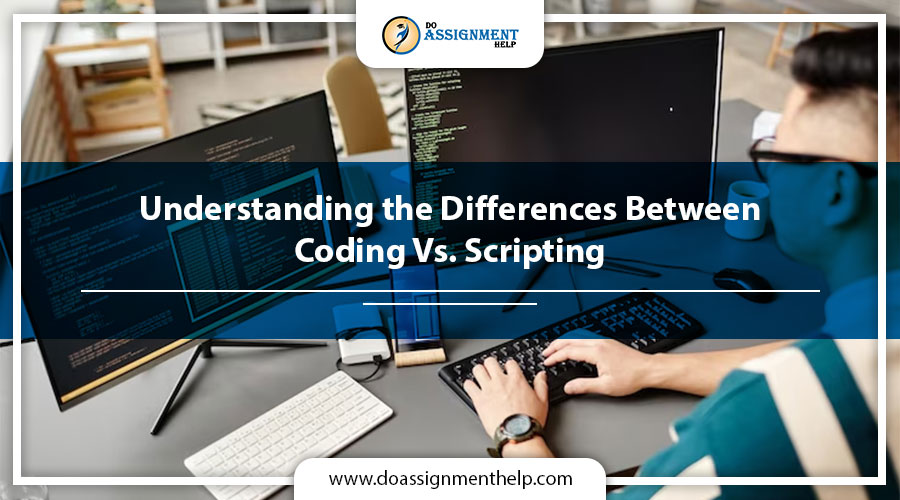Scripting and coding are terms that people use interchangeably. This happens mainly because they sound similar and may conjure images of lines of programming codes. However, those who are familiar with the world of software development know about coding vs. scripting.
In simple words, coding allows you to develop a program, while scripting is for controlling that program that you made using coding. If you are just starting your programming journey, it will help to know how coding and scripting differ from one another. Find out all about these languages in this post.
Table of Contents
What Is Coding or Programming?
Coding helps users to interact with systems. Through coding, developers create websites, mobile, and desktop applications. Put simply, coding or programming is a series of instructions to help achieve a specific goal.
Some of the most popular ways in which developers code is by using Python, Java, C++, and C languages.
These have two primary components. The first is syntax or form, and the second is semantics or meaning. They help in the execution of algorithms and facilitate a computer to perform the needed action.
How does the coding function
Coding gives a set of instructions to computers in a language they can understand and use. The functioning of coding can be understood in the following steps.
- The developer enters a binary code comprising 1s and 0s.
- This code instructs the switches of a computer to turn on 1 or turn off 0.
- Every transistor in a computer gets a 1 or a 0.
- In one computer, thousands of transistors work. So, it is capable of performing numerous actions.
Since it is not possible to manually type a number for every transistor in a system, programming languages are used to quicken this process. To learn about coding in detail, you can connect with an assignment help expert.
What Is Scripting?
Scripting is a form of coding. Through it, you propel a program to execute something. Let us understand scripting with an example.
You created a website that is static. It means none of the elements in it are changing. When you use scripting, it will make website elements like images and text move. So, through scripting, you have made the website dynamic.
Scripting means coding to control programs through APIs. An API or application programming interface allows communication between two or more computer programs. For example, if you make an app to send alerts about the weather, you can use a weather API.
There are two types of scripting languages.
- Server-side scripting languages, which include Pearl, PHP, Python, and the like.
- Client-side scripting languages, which include JavaScript, and VBScript.
An essential difference between coding vs. scripting is in the way both are used. Through scripting, you don’t create a new program but give instructions for one that currently exists. Scripting enriches an application made through coding with new functionalities.
Advantages of Coding
There are numerous advantages of coding. Here are some worth-mentioning ones.
Quick execution: Coding languages are characterized by quick execution. It is because the code has already been compiled. There is a machine code that directly runs to produce the output.
Zero dependencies: The applications created by coding languages are fully independent. It means that they can run without any external program.
Effective programming: A coding language allows the developer to build an entire software from scratch.
Security of the code: Before execution, there is the creation of an executable file by the compiler. So, the developer need not share the original code with anyone else. This offers the security of the actual code.
Advantages of Scripting
You can better understand the differences between coding vs. scripting when you know the benefits of both. Scripting offers the following advantages.
- User-friendly: There is no need to spend much effort or time learning a scripting language and using it.
- No need for compilation: You don’t need to compile the program before its run time when using a scripting language.
- Debug easily: Scripts are very small and have simplistic syntax. So, it is easy to debug them.
- Many use cases: Developers use scripting languages as domain-specific and general-purpose programming languages.
Which Are the Best Languages for Coding and Scripting?
There are some languages ideal for programming and scripting. Since these two processes are also quite similar, you can use these languages to code a program and enrich it with new functionalities.
1. Python
This general-purpose programming language is easy to learn. Its use cases are for web development, game development, mobile development, and artificial intelligence. Companies like Google, Dropbox, Spotify, and YouTube use this language extensively.
2. JavaScript
The JavaScript runs in browsers like Microsoft Edge, Mozilla Firefox, and Google Chrome. Developers have used this language to create some of the highly popular apps like LinkedIn, Netflix, and Candy Fresh. If you want to delve into the mobile and web development domain, learning JavaScript is essential.
3. C#
Also called C sharp, C# is an ideal programming and scripting language. Although it’s a bit more complex than Python and JavaScript, learning it has many benefits. The language is ideal for making computer games that demand a lot of computer power. Some real-world applications that are outcomes of this language are Unity, Microsoft Edge, Photoshop, and Fortnite.
If you want to learn a specific language but are confused, identify your goals. These languages have a wide variety of use cases. If you want to automate tasks, go with Python. JavaScript is ideal for web and mobile applications, while C# is best for creating computer games. It is great for creating dynamic websites and web apps. You can also seek programming assignment help to understand a specific language in detail and learn its nuances.
Coding Vs. Scripting – The Major Differences
The table here will give you deeper insights into the differences between these languages.
S.no |
Coding/Programming |
Scripting |
| 1. | A coding language comprises a set of instructions that the computer understands and implements to create software. | A scripting language is for automating specific processes within software. |
| 2. | A coding language generates the output for the entire app in one attempt. | A scripting language executes the command and generates output one line at a time. |
| 3. | In a coding language, the compiler compiles the program during execution. | In a scripting language, there is no need to compile the script. |
| 4. | A coding language generates an executable file at the time of execution. | A scripting language does not generate an executable file. |
| 5. | A programming language has many concepts and a steep learning curve. | Scripting languages are fairly easy to learn and use. |
| 6. | Coding languages are founded on low-level languages. | Scripting languages prefer high-level languages. |
| 7. | Programming languages facilitate the development of full-fledged software. | Scripting languages help coding languages to make coding quicker and simpler. |
| 8. | Not every coding language is a scripting language. | Every scripting language is a programming language. |
Final Thoughts
We hope that this post has made the differences between coding vs. scripting clearer. Most programs and applications are a result of coding or programming. But they become feature-rich only through scripting. So don’t think that coding is more important than scripting. With the increased demand for dynamic applications, it has become essential for developers to use scripting as well.
 Santa Clara, CA 95050
Santa Clara, CA 95050 





